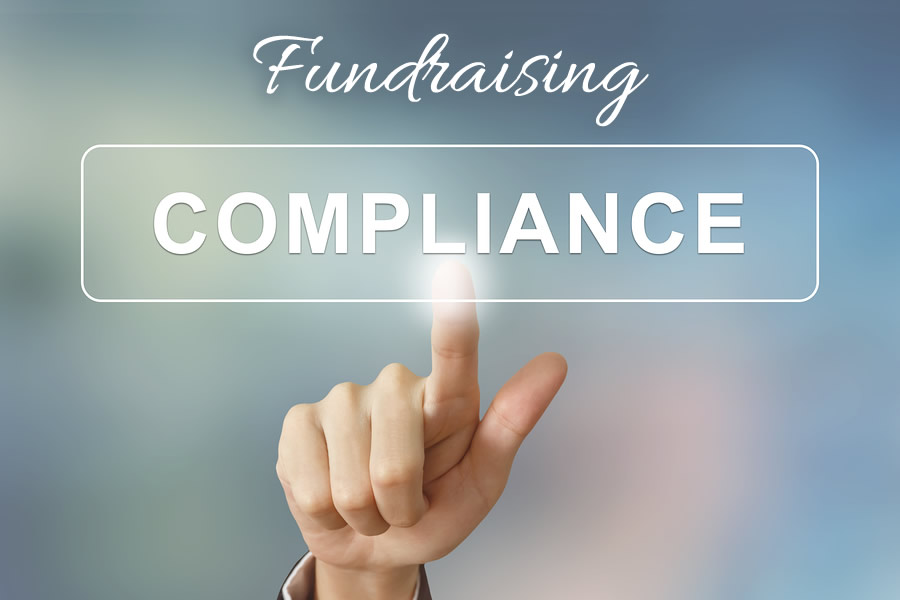
From time to time, I partner with other experts in the field to bring you critical information related to raising major gifts. For this post, I’ve invited James Gilmer of Harbor Compliance to discuss fundraising compliance, a topic all fundraisers should be knowledgeable about.
Fundraising Compliance is a Complex Topic
AE: Welcome James. Thanks for taking the time to discuss fundraising compliance with me and my readers. What can you tell us about fundraising compliance?
JG: As you know, fundraising compliance is a complex topic. I’m going to do my best to break it down.
AE: Terrific. Please share a few critical things every development director and executive director needs to be aware of.
Three Keys to Fundraising Compliance
JG: Here are three things every director should know:
1. A 501(c)(3) isn’t all you need to solicit donations legally.
A 501(c)(3) tax exemption is one of the first things many donors want to see when they’re looking to give to an organization, as it generally allows them to make a gift and get a tax deduction at the end of the year.
Many nonprofits believe they can fundraise limitlessly once they have been granted 501(c)(3) exemption, but fundraising is highly regulated at the state level.
2. Not all states have the same rules and requirements for fundraising registration and renewal.
Currently, forty-four states have laws surrounding a nonprofit’s charitable solicitation (fundraising) activities, and forty-one have an annual filing requirement for most organizations. These registrations are filed in each state where you solicit, meaning that if you’re soliciting in more than one state, you may need to be registered in more than one state.
Plus, what you file in each state and on an annual basis varies quite a bit. Be sure to review your state’s registration requirements.
3. Online fundraising requires registration.
The use of a “Donate Now” button triggers registration requirements nationwide, as you are technically soliciting the citizens of every state.
Many organizations find it easier to register in every state to stay in compliance with ever-changing requirements. Others limit their solicitation activities based on where they register, using the Charleston Principles as a guideline. The Charleston Principles however are not law.
Some states, like Pennsylvania, follow the Charleston Principles in deciding what constitutes an Internet solicitation. Other states, like Florida, do not.
AE: Great tips! Although a pain in the neck, these are critical steps for every nonprofit to take.
Fundraising Compliance Matters to Donors, Too
AE: Let’s discuss why this is important for donors too.
JG: Charitable solicitation laws serve to protect donors from unregulated or illegitimate charities. Donors want to know that their money is going to a worthy cause, and they do their research!
As a nonprofit executive, it is essential to demonstrate your credibility to prospective donors. By staying compliant, you help reassure your donors that they are making a smart investment in your organization and the community.
AE: Yes, being compliant is part of being a trustworthy charity in your donor’s eyes. That’s very important.
Not Complying Can Cause Major Problems
AE: Do you have any parting thoughts or final words of wisdom?
JG: Yes, not complying can cost your organization fines and cause other problems!
We’ve seen fines of over $5,000 for a single infraction in one state. How would a financial hit like that affect your organization?
In some states, officers and directors are personally liable for payment. Besides fines for failure to register or renew, states can revoke your organization’s state tax exemption, and deny your right to solicit in that state altogether.
Ultimately, the benefits of compliance far outweigh the cost of penalties.
AE: Yes, the risk is certainly not worth it. For more information, visit this Fundraising Compliance Guide.
Before you can even consider raising major gifts, make sure your organization is in compliance wherever you are raising funds.
Do you have questions about compliance? Let me know in the comments.
James Gilmer is a compliance specialist for Harbor Compliance, which establishes 501(c) nonprofits and helps them stay compliant. Harbor Compliance assists charities in every state and several countries abroad.

You are a fantastic resource! I recently ventured into Non-Profit from a 20 year career in Corporate Marketing/PR. Thank you for all of your insights, incredibly valuable!